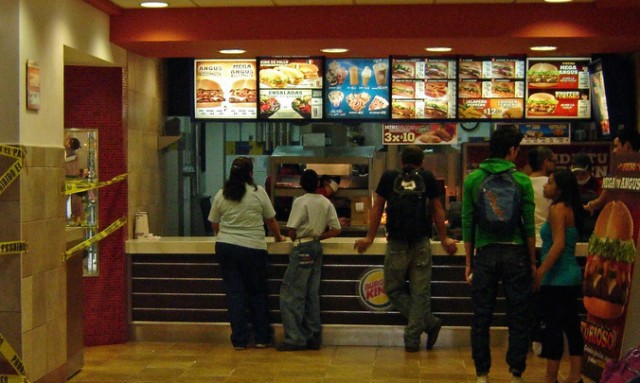Working in the Fast Food Industry for a Minimum of $20 an Hour

In Denmark, $20 an hour is the lowest rate the fast food industry can pay thanks to an agreement between Denmark’s largest union and the Danish employers group Horesta, which includes fast food outlets like Burger King, McDonald’s, Starbucks. John Schmitt, an economist at the Center for Economic Policy Research, tells the Times that Denmark’s model proves that it’s possible to run a profitable fast food business while paying workers decent wages. There’s a hedge to this argument:
Many American economists and business groups say the comparison is deeply flawed because of fundamental differences between Denmark and the United States, including Denmark’s high living costs and taxes, a generous social safety net that includes universal health care and a collective bargaining system in which employer associations and unions work together. The fast-food restaurants here are also less profitable than their American counterparts.
“Trying to compare the business and labor practices in Denmark and the U.S. is like comparing apples to autos,” said Steve Caldeira, president of the International Franchise Association, a group based in Washington that promotes franchising and has many fast-food companies as members.
“Denmark is a small country” with a far higher cost of living, Mr. Caldeira said. “Unions dominate, and the employment system revolves around that fact.”
But as Denmark illustrates, companies have managed to adapt in countries that demand a living wage, and economists like Mr. Schmitt see it as a possible model.
And yet, as the Times also reported earlier this summer, there are plenty of fast food chains in the U.S. — In-N-Out, Shake Shack, Boloco — that pay their workers above the minimum wage and offer other benefits including child care subsidies and 401(k) contributions. Going from earning a minimum wage to a living wage can be life-changing. These are the kinds of businesses that are worth supporting, even if it means higher menu prices, which the Danish simply see as a necessary cost to ensure that employees are being given fair wages:
True, a Big Mac here costs more — $5.60, compared with $4.80 in the United States. But that is a price Danes are willing to pay. “We Danes accept that a burger is expensive, but we also know that working conditions and wages are decent when we eat that burger,” said Soren Kaj Andersen, a University of Copenhagen professor who specializes in labor issues.
And as we’ve learned, there’s a public cost of keeping wages low — a study by U.C. Berkeley has shown that half of the U.S.’s fast food workforce is on public benefits; McDonald’s has told their workers to apply for food stamps to make ends meet. Taxpayers shouldn’t be the one ensuring that low-wage workers can live comfortably.
Photo: laap mix
Support The Billfold
The Billfold continues to exist thanks to support from our readers. Help us continue to do our work by making a monthly pledge on Patreon or a one-time-only contribution through PayPal.
Comments